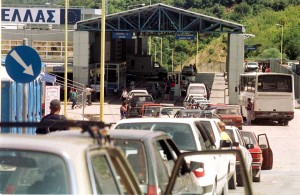Uncertainties in Italy, Greece continue to pose threats to Albania’s recovery
Story Highlights
- A modest recovery in Italy and a new recession in Greece will further affect Albania's exports, investments and remittances from the two neighboring countries, the hosts of more than 1 million Albanian migrants
Related Articles
 TIRANA, Nov. 25 - The uncertain economic outlook on Albania's top trading partners is expected to continue having a negative impact on Albania's economy in the next couple of years.
TIRANA, Nov. 25 - The uncertain economic outlook on Albania's top trading partners is expected to continue having a negative impact on Albania's economy in the next couple of years.
A modest recovery in Italy and a new recession in Greece will further affect Albania's exports, investments and remittances from the two neighboring countries, the hosts of more than 1 million Albanian migrants.
In its latest World Economic Outlook report, the IMF expects Italy to escape its three-year recession in 2015 with a modest growth of 0.8 in 2015 and slightly accelerate to 1.3 percent in 2016 and grow by an average of 1 percent from 2017 to 2019. The unemployment rate in Italy is expected to remain at a record high of around 12 percent in 2016 and slightly drop to 11 percent by 2018.
Neighboring Greece, which escaped its six-year recession only in 2014 is expected to slip back into recession after struggling to reach a new bailout deal on its debt crisis in mid-2015. The IMF expects the Greek economy, which has contracted by about a quarter since the onset of the global financial crisis in 2008, to shrink by another 2.3 percent in 2015 and 1.3 percent in 2017 before returning to positive growth rates of 2 to 3 percent from 2017 to 2019.
The unemployment rate in Greece is also expected to hit a new record high of 27 percent in 2016, which is expected to have serious implications for the Albanian migrants and seasonal workers to the neighboring country.
In its autumn economic forecast, the European Commission says the cyclical recovery of the Italian economy started in 2015 and it is expected to strengthen in 2016 and 2017 as oil prices remain low and domestic demand warms up. “Inflation is forecast to rise very gradually as labour cost pressures remain limited. In 2016, the government structural balance is expected to deteriorate while the debt-to-GDP ratio declines slightly,” says the report.
Meanwhile, the Greek economy is projected to slip back into recession in 2015 after a period of heightened uncertainty culminated in a bank holiday and introduction of capital controls. “The latter is set to have lasting effects on the economy, expected to remain in recession in 2016. The implementation of the new European Stability Mechanism programme will enable a rebound in confidence and investment that is set to support positive growth and the reduction in the general government deficit to below 3 percent of GDP in 2017,” says the European Commission.
The EBRD has earlier warned “Albania’s strong trade, investment and remittance ties to Greece and Italy, both of which face continued economic gloom, are likely to continue to constrain growth and the high level of public debt will limit the room for fiscal manoeuvre.”
Albania’s trade exchanges with Italy and Greece, the country’s top trading partners, foreign investors and sources of remittances, continue declining this year as Italy registered modest growth rates of below 1 percent and Greece returned to negative growth rates in the third quarter of the year.
Albania's trade exchanges with Italy in the first three quarters of this year dropped by 2.8 percent to 210 billion lek (€1.5 billion) and were down by 15 percent to 39 billion lek (€281 million) with Greece which maintains its position as Albania's second top trading partner by only a narrow margin with China.
Six years after the onset of the global financial crisis, trade exchanges with top trade partner Italy have remained almost unaffected but suffered a sharp shrink with neighboring Greece which escaped its six-year recession in 2014.
Italy is Albania’s top trade partner with 50 percent of total exports and 30 percent of imports. More than 80 percent of footwear and garment products manufactured in Albania, which are the country’s main exports, go to Italy.
Once the second destination of Albanian exports, Greece now ranks only the sixth most important. However, Greek businesses are present in almost every sector of the Albanian economy, significantly contributing to the country’s economic growth, ranking it the country’s largest foreign investor.
The escalating crisis in neighboring Greece will affect Albania’s growth by at least 0.25 percentage points, Albania’s central bank says in its latest analysis.
Top trade partner Italy escaping recession and the start of the Trans Adriatic Pipeline construction are expected to have a major impact on the Albanian economy in 2016 after sluggish GDP growth rates of 1 to 2 percent in the past three years.
Public debt at around 70 percent of the GDP, non-performing loans at around a quarter, lending struggling to remain at positive growth rates and a slowdown in exports are considered key barriers to Albania’s growth.
Experts say the spillover risks from the Greek crisis are relatively low and mainly affect exports and remittances, already on a downward trend since Greece plunged into recession in 2008. Meanwhile, the three Greek bank subsidiaries in Albania are considered safe because of operating as independent from their parent banks.
The 2016 budget expects the Albanian economy to slightly accelerate to 3.4 percent, up from an expected 2.7 percent this year, recently revised downward on lower international oil and base metal prices affecting exports and spillover effects from the crisis in neighboring Greece.




